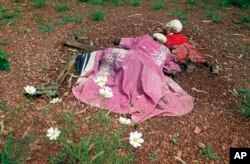President Emmanuel Macron believes France and its Western and African allies “could have stopped” Rwanda’s 1994 genocide but did not have the will to halt the slaughter of an estimated 800,000 people, mostly ethnic Tutsis, the presidency said Thursday.
In a video message to be published Sunday to mark the 30th anniversary of the genocide, Macron will emphasize that “when the phase of total extermination against the Tutsis began, the international community had the means to know and act,” said a French presidential official, asking not to be named.
The president believes that at the time the international community already had historical experience of witnessing genocide with the Holocaust in World War II and the mass killings of Armenians in Ottoman Turkey during World War I.
Macron will say that “France, which could have stopped the genocide with its Western and African allies, did not have the will” to do so, the official added.
The president will not attend commemorations of the genocide this Sunday in Kigali alongside Rwandan President Paul Kagame. France will instead be represented by Foreign Minister Stephane Sejourne.
Macron, during a visit to Rwanda in 2021, recognized France’s “responsibilities” in the genocide and said only the survivors could grant “the gift of forgiveness.”
But he stopped short of an apology, and Kagame, who led the Tutsi rebellion that ended the genocide, has long insisted on the need for a stronger statement.
A historical commission set up by Macron also concluded in 2021 there had been a “failure” on the part of France under former leader Francois Mitterrand, while adding there was no evidence Paris was complicit in the killings.

